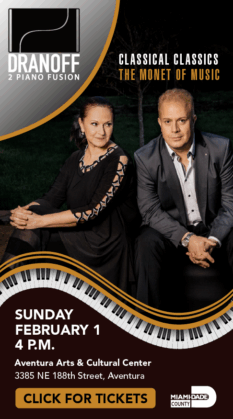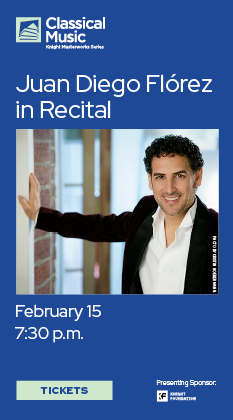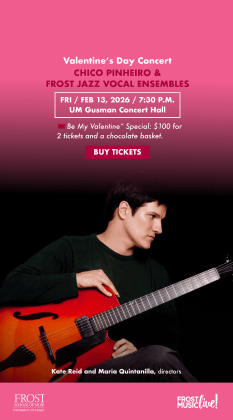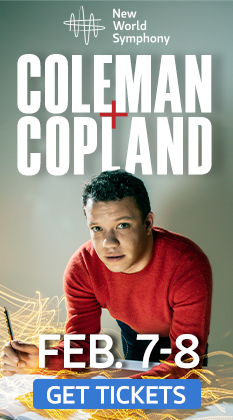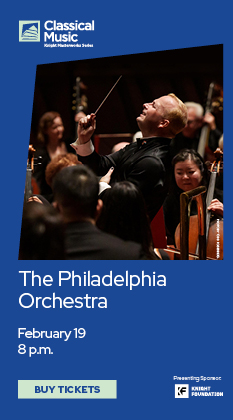Performances
Luis Urbina shows youthful fire and idiosyncrasy for Miami Piano Festival
The Venezuelan-born, Miami-based pianist Luis Urbina displayed impressive technique and distinctive […]
Outstanding singing opens Palm Beach Opera season with “La Boheme”
Palm Beach Opera opened its season Friday night with what it […]
A scary moment apart, Welser-Möst leads Cleveland Orchestra in a memorable Verdi Requiem
Giuseppe Verdi’s Messa da Requiem is one of the great choral-vocal […]
Articles
Top Ten Performances of 2025
1. Britten: War Requiem. Stéphane Denève/New World Symphony Britten’s magnum opus […]
Concert review
A bracing blast of modern music in New World chamber program
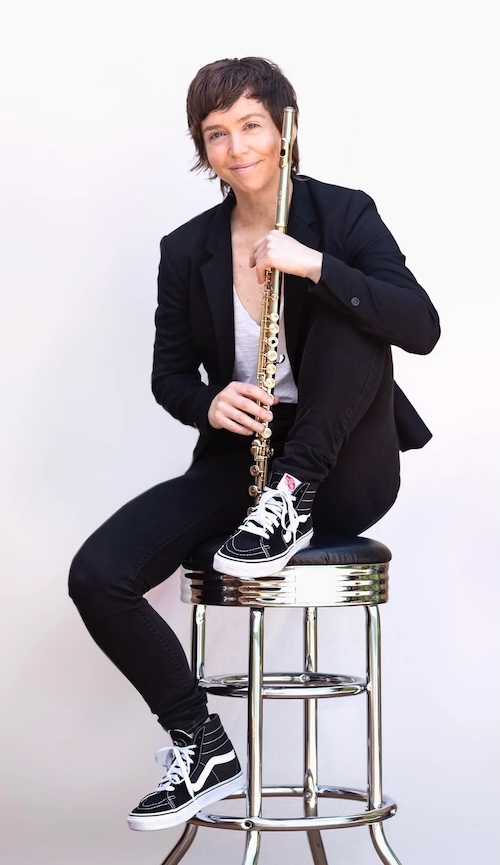
Flutist Claire Chase joined New World Symphony musicians for a chamber concert on Sunday. Photo: Carrie Schneider
On Sunday afternoon, the New World Symphony offered one of the most creative and engaging programs of the season as part of its chamber music series. Renowned flutist Claire Chase coached members of the orchestra in a program which showcased both her own distinctive repertoire and the extraordinary talent of the NWS fellows.
The concert opened with the ballade Amours me fait desirer by 14th Century poet-composer Guillaume de Machaut, which was interpreted by Chase and New World fellows Jamie Kim and Lyric Rivera in an arrangement by composer Marcos Balter for three flutists.
In adapting the vocal music for instrumental performance, Balter used extended techniques including tremolos, flutter-tonguing, overblowing, and timbral trills to imitate the nasal vowels of Machaut’s vernacular, an essential element of his poetry. The flutists are asked to mentally read the ballade’s text while playing, which provoked an intensely expressive reading. Rather than austere, the music sounded vibrant and poignant, steeped in the obsessive world of medieval courtly love.
The concert continued with Terrestre by post-spectral composer Kaija Saariaho. Terrestre is an adaptation of a portion of Saariaho’s flute concerto, Aile du songe, for a reduced chamber setting. She took as her point of inspiration Saint-John Perse’s collection of poems “Oiseaux,” the nature of birds being a perennial theme in the flute repertoire.
The ensemble handled the intricate rhythmic and timbral interplay of the first movement, entitled “Oiseau dansant” (“Dancing Bird”), with deft precision. In the second section, entitled “L’oiseau, un satellite infime de notre orbit planétaire” (“The bird, a tiny satellite of our planetary orbit”), the musicians entered into a more meditative state. Flute soloist Elizabeth McCormack shone throughout with a glimmering tone as she embodied the various roles the piece demands. Saariaho’s music has frequently been linked to light, and indeed the instrumental sounds seemed to glow as they blended in the hall. The demanding solo flute cadenza in the first movement was particularly impressive.
The grand centerpiece of the program was the large-scale work Pan by Balter, a product of Chase’s 24-year commissioning project “Density 2036.” (Oddly, Balter’s name was missing from the concert billing.)
Even in a compacted “suite” version, the work is of epic proportions, not merely a work for solo flute and electronics but a semi-staged Greek tragedy, drawing upon various myths surrounding the half-goat deity Pan. Visuals of forests and abstract bubbly patterns designed by Adam Larsen were projected onto the Frank Gehry-designed panels above the stage, serving as appropriate set design. A Greek chorus of NWS fellows contextualized the dramatic situations through staging and choreography, occasionally inviting audience members to participate in playing various percussion instruments.
The work opened with a tableau of Pan being flayed alive after losing a contest with Apollo. Chase, dressed in furry baggy pants, appeared possessed, thrown into a frenzy by Balter’s acrobatic score, as she stood in the middle of a circle of twelve wine glasses and spat out text in Hildegard of Bingen’s invented “lingua ignota” until falling backwards out of exhaustion.
Tableaus in the middle of the work dealt with the nymphs Syrinx and Echo, who were destroyed fleeing Pan’s unwanted advances. Powerful staging included NWS fellows playing wine glasses illuminated by candlelight and weaving through the audience waving colored LED lights. Chase displayed her extensive performative range, switching between different flute instruments and inhabiting a different personality with each one.
The work concluded with a particularly pathetic scene, in which the lecherous Pan solicits the support of the chorus. One by one, they all turn away, rejecting him. This work showed Chase to be not only a commanding musician, capable of dominating even the most demanding flute repertoire, but a fully convincing actor as well.
The second half of the concert opened with an excerpt from a recent work by legendary, 90-year-old American composer Terry Riley entitled Pulsefield. Above the stage the audience could see images from the work’s graphic score, which bears a striking resemblance to the intensely colorful illuminations of Hildegard’s mystic visions. Though the musical result on its own was by no means refined, it invited the players to participate in the work’s composition in real time, spurring a number of wonderful unexpected moments.
The middle of the second half featured more classical fare, namely Bach’s Triple Concerto, a unique work in his output. Akin to the musical styles of his sons CPE and WF, he juxtaposes disjunct, even contradictory material, in intentionally awkward ways, repeatedly denying the listener’s expectations to outrageous effect. His particularly sensitive, imaginative scoring in this piece undermines the classic statement that “Bach’s music sounds good on any instrument.”
Violinist Erina Buchholz and pianist Shih-Man Weng, seated at the harpsichord, joined Chase, armed with a wooden transverse flute, and a league of NWS string players for this idiosyncratic concerto. Even at a slightly hurried pace, it sounded entirely new, each note infused with intention and meaning. Weng stood out in the vigorous, motoric harpsichord part, which Bach likely wrote for himself to play. The musicians displayed real chamber music sophistication in the delicate second movement, sewing intimate connections between the transparent contrapuntal lines.
The concert concluded with more music by Riley, in this case an assemblage of movements from his modular open-score work The Holy Liftoff, which has been in development since the outbreak of the Covid pandemic in 2020. The score consists of musical fragments accompanied by Peter Max-esque drawings in the style of medieval illuminations, opening itself to a wide range of realization possibilities.
On this occasion, Chase presented a realization for flute, string quartet, and electronics by Samuel Clay Birmaher. The musicians took the composer’s instruction to “play the drawings as much as the score” to heart, offering a convincing and well-formed sequence of tableaux.
Ryan Bancroft conducts the New World Symphony in Aaron Copland’s Symphony No. 3 and Valerie Coleman’s Concerto for Orchestra “Renaissance” 7:30 p.m. February 7 and 2 p.m. February 8. nws.edu
Posted in Performances
No Comments
Coming Up
January 30
Cleveland Orchestra
Franz Welser-Möst, conductor
Yefim Bronfman, pianist
[…]
News
More details released on condition of Cleveland conductor Welser-Möst
The Cleveland Orchestra has provided additional details on the sudden illness […]
